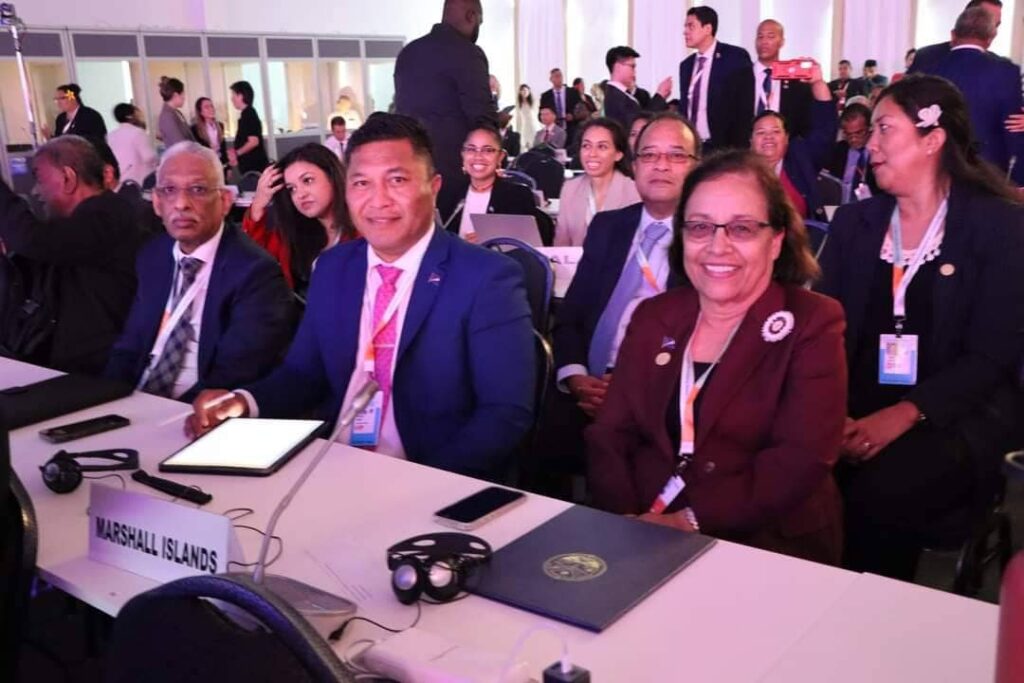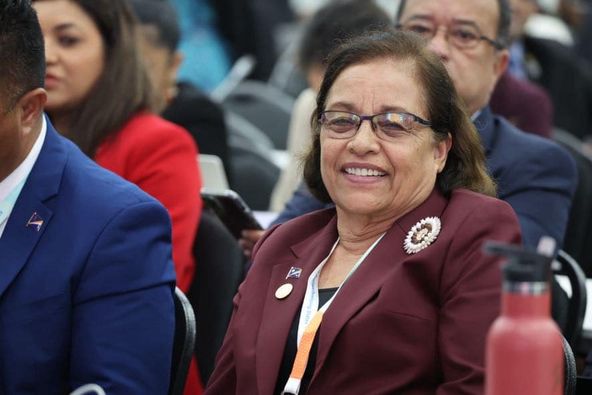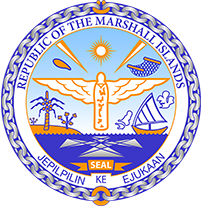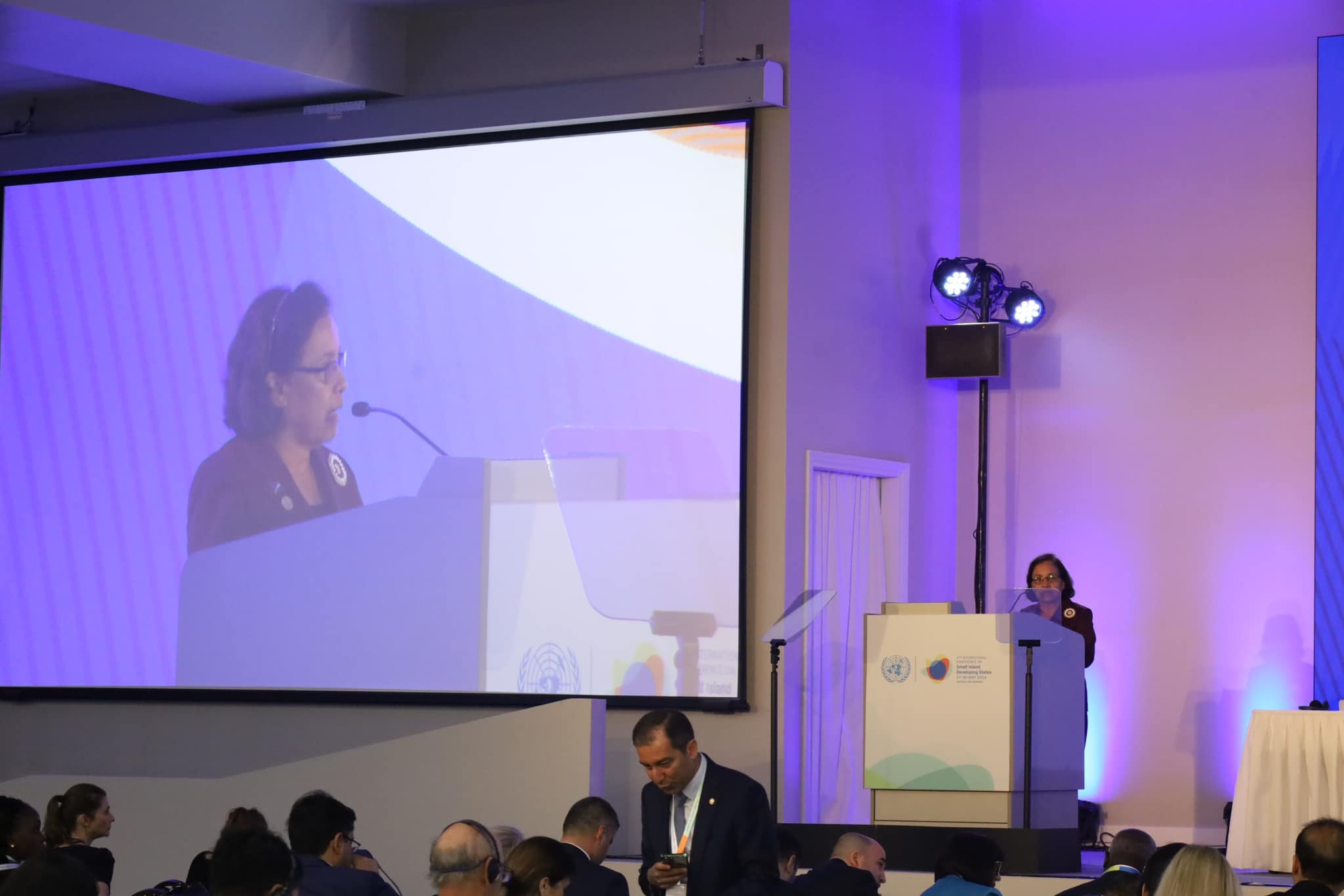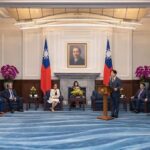May 27, 2024 – Antigua and Barbuda – Her Excellency President Hilda C. Heine delivered the Republic of the Marshall Islands’ national statement during the official opening of the 4th International Conference on Small Islands Developing States (SIDS) in Antigua and Barbuda.
– – –
Mr. Secretary-General, Mr. President, Excellencies,
I am proud to bring the warm greetings of Yokwe to SIDS4.
In particular, I wish to thank the host country, the government and people of Antigua & Barbuda, for their warm hospitality.
Mr. President,
There was a time at the UN where as small island developing states we were questioned, misunderstood or unacknowledged by our partners and the international system.
And that time is done, for the pages of political history. As small island nations, we will no longer be sidelined. Our island peoples, and our island leaders, have made our voice known, loud and clear. And on sustainable oceans and fisheries, as SIDS and large ocean nations, we have joined together to help rewrite the fate of global oceans.
For the Marshall Islands and many small island developing states – human rights cannot be a distant ideal. The basic dignity and core social development- the fundamental freedoms which all must be able to enjoy – remain out of reach for some. We know from our own history and experience that larger politics cannot be allowed to drown out the voices of the most vulnerable.
That is why the Marshall Islands has declared our candidacy for the UN Human Rights Council elections later this year.
Mr. President,
We know that some have been listening – large multinational banks are prepared to spend $400 billion on SIDS over the next decade. But what will change on our shores in 10 years? We may realize a flood of consultants and reports, to match the rising seas. But it is vital that there be a major step-change in – and indeed much of our national future rests upon this. We know what is needed – and we know the hard task at home to build a national and government that will meet these challenges, to ensure we not just survive – but thrive.
We can point to the new UN Multi-Country office in Micronesia as a strong example of how management reforms, and increased agency presence, can play a vital role in tackling the SDGs with island-tailored strategies. It is an urgent priority to boost our data capacity, including in line ministries.
But across all key sectors – it is well past time that our development partners and the UN system sharply upscale efforts to adjust your large systems to small island state structures and scales. Until that happens as a needed step-change, our aspirations will remain out of reach. It is what AOSIS has been telling you for decades, and we are now at the breaking point.
Mr. President,
As Small Island Developing States, we can’t afford continued inaction on climate, and to ignore what the scientists are telling us, with ever-growing despair and frustration.
At the UNFCCC COP28, we collectively made a commitment that we would transition away from fossil fuels. And yet, we are watching countries – even those that celebrated the deal in Dubai – continue to expand the exploration and use of fossil fuels. Promises of $100 billion per year and to double adaptation finance have gone unmet. The result is devastating loss and damage.
In just the first weeks of office, our government had to approve $1.8 million, a significant hit to our small economy, to help our people facing severe drought and inundation – a direct result of the climate crisis. In turn, we have less money for health, for education, and for development.
This year we have the potential to transform our approach to climate finance. And we need to. The costs of the climate crisis are about to rise exponentially, and a half-hearted approach and unmet promises won’t work.
We need to see a new finance goal that drastically increases the amount of finance available to SIDS, particularly for adaptation and loss and damage.
To give a sense of the scale of challenge, our National Adaptation Plan says that to protect only two major population centers will cost $9 billion. $9 billion will cover the hard infrastructure protection. It won’t cover the other things to adapt – like strengthening health or education systems, or preserving our local cultures. And it won’t be enough to address the implications of populations being forced to leave their homes, as sea levels rise and the impacts make life in some parts of our country untenable.
We also need to treat the search for finance with the gravity it deserves. Again, SIDS have led the charge. In the Pacific, we have come together with our allies to develop a proposal for a levy on maritime shipping, to ensure this industry finally takes responsibility for its climate pollution. This levy would speed the transformation to a greener industry, while also providing billions of dollars to ensure that transition is equitable for the most impacted. This is a proposal led by some of the most vulnerable countries, whose economies are heavily reliant on shipping. We urgently need to reduce emissions and fund climate action within and beyond the shipping sector. This levy should be a no-brainer.
We must also reform the international financial system. My fellow leader, Barbados Prime Minister Mottley, has led the charge with the Bridgetown Agenda. Let’s turn the discussions on this into reality.
The money exists, but it’s not being spent wisely. In 2022, subsidies for fossil fuel consumption topped one trillion dollars. Imagine the impact that money could have if it went to adaptation, or renewable energy, or to the world’s most needy. The costs will only rise, and will be paid in more and more human lives, if we fail to deal with the root cause: fossil fuels.
This is why we are proud to announce today that we are joining the initiative for a Fossil Fuel Non-Proliferation Treaty. This Treaty is a vital step to halting the expansion of fossil fuels and ensuring that there is an equitable, urgent transition to renewables.
My country has stood strong through a challenging history, including a legacy of nuclear testing that continues to affect our population to this day. The world has recognized, though not fully addressed, the peril of nuclear weapons. We must treat the root of the climate crisis, fossil fuels, with similar gravity. We cannot pretend that the continued development of fossil fuels is not a danger to us all.
Dubai set us on the course for this transition away from fossil fuels. We won’t stay within the 1.5 degree temperature limit without it. We need every country – but particularly the G20, which makes up 80% of global emissions – to deliver on that commitment. And we need them to say how they’ll do so in updated NDCs next year.
The climate crisis puts the human rights of all countries and people at risk, but SIDS are being hit hardest and fastest. We must stay united in our commitment to ambition, and to justice and safety for our people and future generations.
